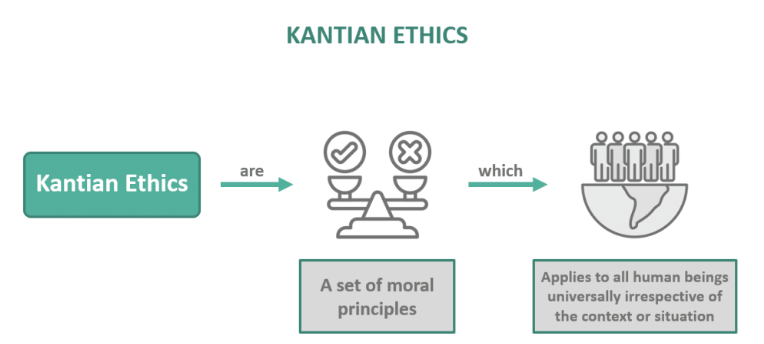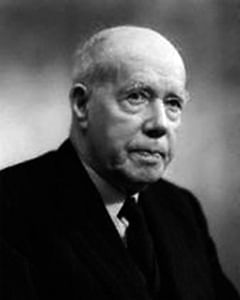UPSC Exam > UPSC Notes > UPSC Mains: Ethics, Integrity & Aptitude > Kantian Ethical Theory
Kantian Ethical Theory | UPSC Mains: Ethics, Integrity & Aptitude PDF Download
Kantian Ethical Theory

- Kantianism (or Kantian ethical theory) is a deontological approach that focuses entirely on "duty" rather than emotional feelings or end goals. The central idea is "duty"—what one should do in specific situations. Kantianism asserts that truly moral or ethical actions are driven by a sense of "duty" and an understanding of what is right and just on a broader scale, regardless of potential consequences for the individual or their usefulness to others. This theory is rooted in the work of the German philosopher Immanuel Kant (1724–1804).
- Kant believes that moral law comes from pure will, which is free and rational, self-determined, and self-legislative. A person is free when they are guided by their own will, not the will of others. Kant refers to the moral law imposed by practical reason as the "Categorical Imperative." The Categorical Imperative is an internal law enforced by one's conscience. In essence, it represents an absolute, unconditional obligation that holds authority in all situations, being both necessary and justified as an end in itself.
- Kant opposed utilitarianism and other moral philosophies of his time. For instance, a utilitarian might justify murder if it leads to the greatest good for the greatest number of people, or someone focused on maximizing their own benefit might view murder as acceptable or irrelevant. Kant argued that such moral systems cannot effectively guide moral actions or serve as a foundation for moral judgments because they rely on subjective factors. As an alternative, he proposed a deontological moral system, one based on the objective demands of the categorical imperative.
- Building on Kant's theory, philosopher W.D. Ross outlined several fundamental duties, or categorical imperatives, that individuals should follow.
 These include:
These include:- Telling the truth
- Righting the wrongs one has done to others
- Acting justly
- Helping others in terms of virtue, intelligence, and happiness
- Improving oneself in terms of virtue and intelligence
- Expressing gratitude
- Avoiding harm to others
- Kant's principle is encapsulated in the idea: "Act so as to treat others as ends and not merely as means."
Corruption and Ethical Theories

- Virtue ethics would view corruption as a violation of several categorical imperatives, such as "avoid injury" and "act justly," because corruption involves favoring certain individuals unfairly.
- Similarly, deontological ethics (Kantianism) focuses on your adherence to principles, disregarding the consequences of an action. It would argue that corruption involves deceit and erodes the rational and moral abilities of those involved, thus deeming it unethical.
- Consequentialist theories, such as utilitarianism, might view corruption as ethical. Some have argued that corruption can "grease the wheels" and improve the efficiency of bureaucracies, benefiting most people. While this view is less common today, as the short-term efficiency gain is often outweighed by the long-term harm to the system, it demonstrates a perspective from which corruption could be considered ethical.
Virtues and Good Conduct
- Virtues are positive traits of character, while vices are negative traits. Virtues, as good qualities, can and should be intentionally nurtured. They contribute to the survival and well-being of both individuals and society. A good or moral life is built through the consistent practice of good deeds or actions in various situations.
- The 'character' and 'conduct' of a person are closely connected. A person's conduct is the outward expression of their character in different situations. Moral character, on the other hand, is developed through consistently performing good actions. In this way, virtues can be nurtured and seen as character-values. Since virtues can be cultivated, they are also viewed as acquired qualities of a virtuous person. Therefore, virtues represent the excellence of human character, while vices are flaws in character. These virtues reflect a person’s inner traits, forming the morality of being, whereas duty and good actions relate to the morality of doing. A key message from great individuals is: Be good and do good, and the path to being good is through the consistent practice of good actions.
- Duties are required actions that a person must fulfill. Virtue, on the other hand, refers to the moral qualities of an individual. Therefore, we describe someone as virtuous if they have good qualities. A virtuous person is not only good but also consistently performs good actions. Virtue is a continual practice, not something that can be set aside. The presence of virtues in a person is shown through their regular good behavior. One must choose to be virtuous and commit to actions that are good and right. Virtues enhance the well-being of both the individual and society, while vices harm the welfare of the person.
The document Kantian Ethical Theory | UPSC Mains: Ethics, Integrity & Aptitude is a part of the UPSC Course UPSC Mains: Ethics, Integrity & Aptitude.
All you need of UPSC at this link: UPSC
|
78 videos|100 docs
|
Related Searches

















